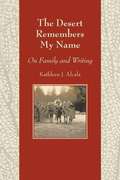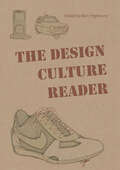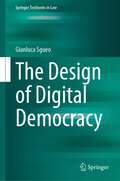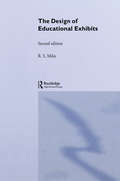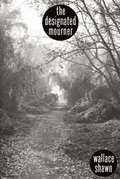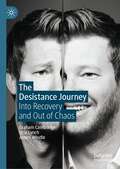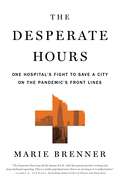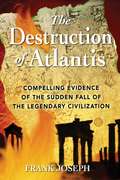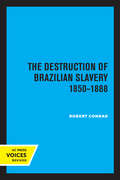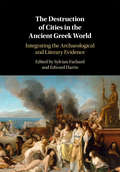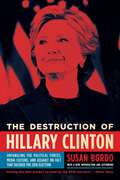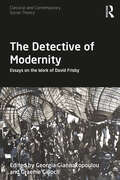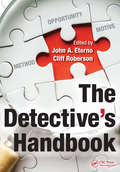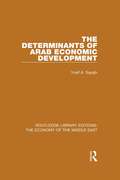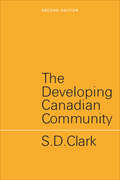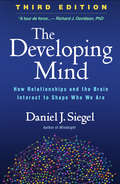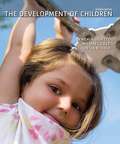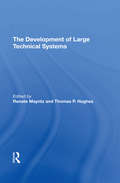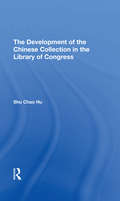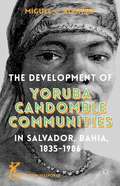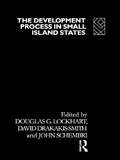- Table View
- List View
The Desert Remembers My Name: On Family and Writing (Camino del Sol)
by Kathleen J. AlcalaAlthough the essays are in many ways personal, they are also universal. When she examines her family history, she is encouraging us to inspect our own families, too. When she investigates a family secret, she is supporting our own search for meaning. And when she writes that being separated from our indigenous culture is “a form of illiteracy,” we know exactly what she means.
The Design Culture Reader
by Ben HighmoreDesign is part of ordinary, everyday life, to be found in every room in every building in the world. While we may tend to think of design in terms of highly desirable objects, this book encourages us to think about design as ubiquitous (from plumbing to television) and as an agent of social change (from telephones to weapon systems).The Design Culture Reader brings together an international array of writers whose work is of central importance for thinking about design culture in the past, present and future. Essays from philosophers, media and cultural theorists, historians of design, anthropologists, cultural historians, artists and literary critics all demonstrate the enormous potential of design studies for understanding the modern world. Organised in thematic sections, The Design Culture Reader explores the social role of design by looking at the impact it has in a number of areas �€“ especially globalisation, ecology, and the changing experiences of modern life. Particular essays focus on topics such as design and the senses, design and war and design and technology, while the editor's introduction to the collection provides a compelling argument for situating design studies at the very forefront of contemporary thought.
The Design Student's Handbook: Your Essential Guide to Course, Context and Career
by Jane Bartholomew Steve RutherfordWhat is design? What are the main design disciplines, and how do they interrelate? How does design theory and context help you improve your studio work? What do you need to know by the end of your course to get a good career? What can you do to become a knowledgeable designer and improve your skills so that you stand out from the crowd? Whether you are already studying design, thinking about choosing a course, or are well on your way to finding your first job, this essential and uniquely comprehensive book will introduce you to the world of design and support you throughout your studies and on into the industry. Key features Develops your core skills and supports you in making the most of your studies. Describes the multi-disciplinary design world by exploring the various design disciplines – graphics, fashion and textiles, three-dimensional design, craft, spatial, interactive media, and theatre, film and television. Contains crucial practical information so you’re ready for your career - placements, working with industry and self-employment, networking, job-seeking and how to succeed in your own business. Covers the key practical, theoretical and cultural fundamentals of design to help you understand and inform your practice - chapters on creativity and innovation, history, culture and context, how to communicate design, colour theory, aesthetics, and how to design with ethical, social and responsible considerations. Comprises chapters written by designers and lecturers, all experts in their fields. Includes stories, career profiles and first-hand quotes by students, established designers and industry specialists exploring what it’s like to study and to work in the design industry today. Identifies important books and websites for further reading. The Design Student’s Handbook will guide you along the road to a successful and fulfilling career and is an essential text for studying any of the design disciplines.
The Design of Digital Democracy (Springer Textbooks in Law)
by Gianluca SgueoEver-stronger ties between technology, entertainment and design are transforming our relationship with democratic decision-making. When we are online, or when we use digital products and services, we tend to focus more on certain factors like speed of service and user-friendliness, and to overlook the costs – both for ourselves and others. As a result, a widening gap separates our expectations of everything related to digitalization – including government – and the actual practice of democratic governance. Democratic regulators, unable to meet citizens’ demands for tangible, fast and gratifying returns, are seeing the poorest results ever recorded in terms of interest, engagement and retention, despite using the most cutting-edge technologies. This book explores various aspects of the relationship between democracy, technology and entertainment. These include, on the one hand, the role that digital technology has in strengthening our collective intelligence, nurturing empathic relations between citizens and democratic institutions, and supporting processes of political aggregation, deliberation and collaboration. On the other hand, they comprise the challenges accompanying digital technology for representation, transparency and inclusivity in democratic decision-making. The book’s main argument is that digital democratic spaces should be redesigned to narrow the gap between the expectations and outcomes of democratic decision-making. It suggests abandoning the notion of digital participatory rights as being fast and easy to enjoy. It also refutes the notion that digital democratic decision-making can only be effective when it delivers rapid and successful responses to the issues of the day, regardless of their complexity. Ultimately, the success or failure of digital democracy will depend on the ability of public regulators to design digital public spaces with a commitment to complexity, so as to make them appealing, but also effective at engaging citizens.
The Design of Educational Exhibits
by M. B. Alt D. C. Gosling Dr R Miles R. S. MilesFirst Published in 1988. Routledge is an imprint of Taylor & Francis, an informa company.
The Designated Mourner
by Wallace Shawn"The play nicely combines Pinterian menace with caustic political commentary." -Time"Acerbic, elusive, poetic and chilling, the writing is demanding in a rarefied manner. Its implications are both affecting and disturbing." -Los Angeles Times"In his exquisitely written dramatic lament for the decline of high culture. . . . [Shawn] offers a definition of the self that should rattle the defenses of intellectual snobs everywhere." -The New York TimesWriter and performer Wallace Shawn's landmark 1996 play features three characters--a respected poet, his daughter, and her English-professor husband--suspected of subversion in a world where culture has come under the control of the ruling oligarchy. Told through three interwoven monologues, the Orwellian political story is recounted alongside the visceral dissolution of a marriage. The play debuted at the Royal National Theatre in London, in a production directed by David Hare, who also directed the film version, starring Mike Nichols and Miranda Richardson. The play's subsequent New York premiere was staged in a long-abandoned men's club in lower Manhattan, directed by Shawn's longtime collaborator André Gregory.Wallace Shawn is the author of Our Late Night (OBIE Award for Best Play), Marie and Bruce, Aunt Dan and Lemon, The Fever, and the screenplay for My Dinner with André. His most recent play, Grasses of a Thousand Colors, premiered last year in London.
The Desistance Journey: Into Recovery and Out of Chaos
by Orla Lynch James Windle Graham CambridgeThis book examines desistance from offending amongst men in County Cork – the largest county in the Republic of Ireland. It examines the bigger picture of desistance, namely how offending and recovery from addiction are inseparable processes. It draws on in-depth interviews with 40 men who had engaged with the criminal justice system, and the chapters which follow trace the participants’ life histories: from the hardships they endured as children through their recollection of their reckless teenage years into active addiction and their often numerous attempts at recovery and eventually, for most, full recovery. It challenges some of the dominant assumptions that exist around desistance, and discusses topics such as toxic masculinity. It offers a practice friendly account of the academic work on desistance and a multidisciplinary holistic account of the process of doing desistance.
The Desperate Hours: One Hospital's Fight to Save a City on the Pandemic's Front Lines
by Marie BrennerAWARD-WINNING VANITY FAIR WRITER Marie Brenner shares a remarkable depiction of New York—a city in crisis—based on new, behind-the-scenes reporting that captures the resilience, peril, and compassion of the early days of the Covid pandemic.In the spring of 2020, COVID-19 arrived in New York City.Before long, America’s largest metropolis was at war against a virus that mercilessly swept through its five boroughs. It became apparent that if Covid wasn’t somehow halted, the death count in New York alone would be in the hundreds of thousands. And if New York’s hospitals failed, what chance did the rest of the country have?Brenner, having been granted unprecedented 18-month access to the entire New York-Presbyterian hospital system, tells the story of the doctors, nurses, residents, researchers, and suppliers who tried to save lives across Manhattan, Queens, and Brooklyn and the northern periphery of the city. Drawing on more than 200 interviews, Brenner takes us inside secure ICU units, sealed operating rooms, locked executive suites, unknown basement workshops, and makeshift clinics to provide extraordinary witness to the war as it was waged on the front line. But The Desperate Hours is more than a thrilling account of medicine under extreme pressure. It is an intimate portrait of courageous men and women coming together in their devotion to duty, their families, each other, and the city they loved more than any other.
The Desperate People
by Farley MowatMowat's tribute to the last survivor's of the Ihalmiut, People of the Deer - brave, proud and now fighting to save themselves from extinction.
The Destruction of Atlantis: Compelling Evidence of the Sudden Fall of the Legendary Civilization
by Frank JosephThe most comprehensive reconstruction of the history and fate of the legendary ancient civilization of Atlantis • Draws together compelling evidence from geology, astronomy, myths, and ancient texts to prove the existence of Atlantean civilization and its catastrophic end• Includes a vivid narrative that re-creates the last days of AtlantisAll human cultures, from classical and biblical to native North and South American, share the myth of an ancient deluge that often coincides with a rain of fire from the heavens. Now, in The Destruction of Atlantis, author Frank Joseph links this worldwide cultural phenomenon to the story of the lost civilization of Atlantis, which in a single day and night disappeared into the sea in a violent cataclysm.In the most comprehensive account of this legendary island, Frank Joseph provides compelling evidence based on 20 years of research around the globe that Atlantis was at the root of all subsequent human civilizations. Refuting modern skepticism, he provides evidence from archaeology, geology, astronomy, and ancient lore to prove the existence of Atlantean civilization in the context of Near Eastern Bronze Age society at the end of the 13th century B.C.E. He combines hard scientific evidence with a stunning and imaginative re-creation of what it must have been like to walk the streets of Atlantis in its last days. The resulting portrait of a mighty empire corrupted by an overreaching lust for wealth and power offers an important lesson to our own materialistic civilization.
The Destruction of Brazilian Slavery 1850 - 1888
by Robert ConradThis title is part of UC Press's Voices Revived program, which commemorates University of California Press’s mission to seek out and cultivate the brightest minds and give them voice, reach, and impact. Drawing on a backlist dating to 1893, Voices Revived makes high-quality, peer-reviewed scholarship accessible once again using print-on-demand technology. This title was originally published in 1972.
The Destruction of Cities in the Ancient Greek World: Integrating the Archaeological and Literary Evidence
by Edward M. Harris Sylvian FachardFrom the Trojan War to the sack of Rome, from the fall of Constantinople to the bombings of World War II and the recent devastation of Syrian towns, the destruction of cities and the slaughter of civilian populations are among the most dramatic events in world history. But how reliable are literary sources for these events? Did ancient authors exaggerate the scale of destruction to create sensational narratives? This volume reassesses the impact of physical destruction on ancient Greek cities and its demographic and economic implications. Addressing methodological issues of interpreting the archaeological evidence for destructions, the volume examines the evidence for the destruction, survival, and recovery of Greek cities. The studies, written by an international group of specialists in archaeology, ancient history, and numismatic, range from Sicily to Asia Minor and Aegean Thrace, and include Athens, Corinth, and Eretria. They highlight the resilience of ancient populations and the recovery of cities in the long term.
The Destruction of Hillary Clinton, (EBK)
by Susan BordoIn a mere few months during the 2016 presidential campaign, the accomplished and poised former Senator and Secretary of State was turned into something unrecognizable. Hillary was 'flawed. ' 'Historically unpopular. ' 'Untrustworthy. ' Not 'available' enough to the media or 'the people. ' We heard it - and more - from our neighbours overseas, on social media, in our offices and our houses. What happened? In a week-by-week narrative of the campaign year - from the primaries through election day - Bordo deconstructs the various forces that contributed to Hillary Clinton's political destruction.
The Detective of Modernity: Essays on the Work of David Frisby (Classical and Contemporary Social Theory)
by Georgia Giannakopoulou and Graeme GillochThis book explores the thought of – and is dedicated to – David Frisby, one of the leading sociologists of the late twentieth and early twenty-first centuries. Presenting original examinations of his unique social theory and underlining his interdisciplinary approach to the critical interpretation of modern metropolitan society and culture, it emphasises Frisby’s legacy in highlighting the role of the social researcher as a collector, reader, observer, detective and archivist of the phenomena and ideas that exemplify the modern metropolis as society. With contributions from sociologists, cultural theorists, historians of the city, urban geographers and designers, and architectural historians and theorists, The Detective of Modernity constitutes a wide-ranging engagement with Frisby’s profound legacy in social and cultural theory.
The Detective's Handbook
by Cliff Roberson John A. EternoThe Detective‘s Handbook details the vital information law enforcement officers need to know to become better detectives. Since all essential aspects of detective work cannot be covered in a single volume, the editors have selected 20 of the most critical issues detectives face in their day-to-day work and present them in separate chapters.Using a
The Determinants of Arab Economic Development (Routledge Library Editions: The Economy of the Middle East)
by Yusuf A. SayighThis book explores in depth the factors determining economic development in the Arab region. The particular factors relevant to the Arab world are also set within the context of the broad political economy of underdevelopment. The factors are identified as comprising three main groups: economic, political administrative and socio-cultural; petroleum and regional Arab economic development are examined separately. The force and operation of each determinant is further assessed in the context of the individual countries, from which the author is able to arrive at some important conclusions concerning the interaction of these determinants and their impact upon development. First published in 1978.
The Determinants of Leadership: China, Japan and the United States in East Asia (Contributions to International Relations)
by Fei SuThis book investigates the determinants of leadership in East Asia, emphasizing the significance of followership in the success and failure of leadership projects proposed by China, Japan, and the United States. While doing so, it answers a central question in the field of international relations: Why do potential leader countries succeed in obtaining potential followers in some instances, but fail to do so in other instances? Employing an inclusive leadership and societal approach, the book investigates how the leading countries motivate followership in East Asian economic and security dynamics. It analyzes how Chinese, Japanese and American leadership obtained acceptance from potential followers, focusing on the significance of domestic politics of potential follower countries in shaping their governmental preferences and generating followership. The book features empirical evidence in six case studies, covering topics such as the successful Chinese endeavor of South Korea joining the Chinese initiative for the Asian Infrastructure and Investment Bank (AIIB), the failed US attempt to prevent South Korea from doing so, the US's success to convince Japan to join the Trans-Pacific Partnership (TPP), the failed Japanese strive for winning South Korea's support for Japan’s bid for a permanent seat at the UN Security Council (UNSC), the Chinese failure at obtaining the Philippines’ backing of the Chinese aspirations in the South China Sea (SCS) during the Aquino Presidency, and, finally, the Chinese success one the same effort during the Duterte presidency.The book will appeal to students, scholars, and researchers of international relations interested in a better understanding of leadership determinants in East Asia, Global Power Shift, foreign policy, as well as East Asian economic and security dynamics.
The Detroit Riot of 1967
by Hubert G. LockeDuring the last days of July 1967, Detroit experienced a week of devastating urban collapse—one of the worst civil disorders in twentieth-century America. Forty-three people were killed, over $50 million in property was destroyed, and the city itself was left in a state of panic and confusion, the scars of which are still present today. Now for the first time in paperback and with a new reflective essay that examines the events a half-century later, The Detroit Riot of 1967 (originally published in 1969) is the story of that terrible experience as told from the perspective of Hubert G. Locke, then administrative aide to Detroit’s police commissioner. The book covers the week between the riot’s outbreak and the aftermath thereof. An hour-by-hour account is given of the looting, arson, and sniping, as well as the problems faced by the police, National Guard, and federal troops who struggled to restore order. Locke goes on to address the situation as outlined by the courts, and the response of the community—including the media, social and religious agencies, and civic and political leadership. Finally, Locke looks at the attempt of white leadership to forge a new alliance with a rising, militant black population; the shifts in political perspectives within the black community itself; and the growing polarization of black and white sentiment in a city that had previously received national recognition as a “model community in race relations.” The Detroit Riot of 1967 explores many of the critical questions that confront contemporary urban America and offers observations on the problems of the police system and substantive suggestions on redefining urban law enforcement in American society. Locke argues that Detroit, and every other city in America, is in a race with time—and thus far losing the battle. It has been fifty years since the riot and federal policies are needed now more than ever that will help to protect the future of urban America. All historians, from professional to novice, will find value in this compelling account of a marked moment in American history.
The Developing Canadian Community: Second Edition
by S. D. ClarkProfessor Clark's thesis is that the development of Canadian society can only be understood by examining how changes taking place in the underlying structure of the Canadian community. The first part of the book examines the development of forms of social organization in Canada over the years 1600 to 1920. In the second and third sections the focus shifts to the general forces in Canadian society shaping the character of institutions and forms of social life. The book concludes with four essays devoted to an examination of the relationship of sociology to history. This volume demonstrates the mutually enriching value of a sociological-historical approach, and is very useful for those interested in communities, social change and organization, and the structure of Canadian society.
The Developing Mind, Third Edition: How Relationships and the Brain Interact to Shape Who We Are
by Daniel J. SiegelThis highly influential work--now in a revised and expanded third edition incorporating major advances in the field--gives clinicians, educators, and students a new understanding of what the mind is, how it grows, and how to promote healthy development and resilience. Daniel J. Siegel synthesizes cutting-edge research from multiple disciplines, revealing the ways in which neural processes are fundamentally shaped by interpersonal relationships throughout life. And even when early experiences are not optimal, building deeper connections to other people and to one's own internal experience remains a powerful resource for growth. Professors praise the book&’s utility in courses from developmental psychology and child development to neuroscience and counseling. New to This Edition *Incorporates findings from a huge body of recent research; over 1,000 citations added. *Revisits and refines the core hypotheses of interpersonal neurobiology. *Chapter on the experience of belonging and the development of identity. *New or expanded discussions of behavioral epigenetics, the default mode network of the brain, social neuroscience, cultural and gender issues, theory of mind, the Wheel of Awareness contemplative practice, the science of consciousness, and more.
The Development Of Children, 7th Edition
by Michael Cole Cynthia Lightfoot Sheila R. ColeThe Development of Children has long been acclaimed for its authoritative chronological exploration of how the lives of children are shaped by biological and cultural factors. In this thoroughly updated new edition, lead author Cynthia Lightfoot builds on the legacy of original authors Michael and Sheila Cole, offering a lively, engaging, and always accessible examination of child development as a process involving the whole child within multiple, mutually influencing contexts. Throughout, the emphasis is on how the interaction of biology and culture contributes both to the universal pathways of development shared by all children and to the diverse developmental patterns that unfold in the lives of individual children. What's in the LaunchPad
The Development Of Large Technical Systems
by Thomas Hughes Renate MayntzThis book is an outcome of the conference on the development of large technical systems held in Berlin in 1986. It focuses on the comparative analysis of the development of large technical systems, particularly electrical power, railroad, air traffic, telephone, and other forms of telecommunication.
The Development Of The Chinese Collection In The Library Of Congress
by Shu Chao HuThis is the first comprehensive and in-depth study of the Chinese collection in the Library of Congress, the largest collection of its kind in the Western world. Started in 1869 with some 950 books received in the first exhange of publications between the United States and China, the collection has grown so steadily that in 1977 it numbered more than 430,000 volumes, including 2,000 rare Chinese items, some of which were printed in A.D. 975. In this primarily historical study, Professor Hu examines the social, cultural, and political forces that led to the development and growth of the collection, the acquisitions policies followed, and the sources of personal and financial support found within and outside the Library of Congress. He also explores the methods by which the library has built up several strong areas in the collection, particularly those of Chinese gazetteers, or local histories; ts’ung-shu, or collections of reprints; and rare works.
The Development Of Yoruba Candomble Communities In Salvador, Bahia, 1835–1986
by Miguel C. AlonsoThis project is an attempt to bring together the many fragments of history concerning the Yoruba religious community and their rise to prominence in Salvador, Bahia, Brazil, from the mid-nineteenth to the late-twentieth centuries.
The Development Process in Small Island States
by David Drakakis-Smith Douglas G. Lockhart John SchembriFirst Published in 2004. Routledge is an imprint of Taylor & Francis, an informa company.
